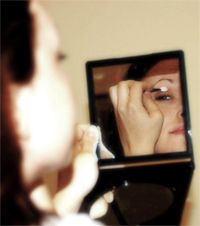If blemishes bother you or skin splotches stress you out, you might want to take a deep breath and relax. As far as your skin is concerned, there's truth in the old adage that worrying accomplishes nothing. In fact, worrying about the condition of your skin could actually make things worse.
Stress has a negative effect on your skin. When you get stressed out, your body produces higher levels of a stress hormone called cortisol, which leads to an increase in your body's production of oil. Too much oil can cause acne, even in people who don't usually break out.
Advertisement
In addition to giving your skin an oily sheen, stress can also dehydrate your skin and interfere with its ability to repair itself when it's damaged. Stress can bring on new skin problems or aggravate existing conditions, such as rosacea, psoriasis and eczema [sources: Archives of Dermatology, American Academy of Dermatology].
If you find yourself avoiding mirrors or throwing up your hands in frustration because of the condition of your skin, you might be experiencing the psychological effects of stress. Neglecting your skin in despair or rubbing or pulling at it because you don't know what else to do often makes existing skin problems much worse [source: American Academy of Dermatology].
On the bright side, there are many things you can do to get rid of the anxiety that's wreaking havoc on your skin. Here are some practical ways to reduce overall stress and help your skin at the same time:
- Exercise -- Working out releases endorphins, which can help to banish all that anxiety.
- Moisturize -- Since stress can dehydrate your skin, using moisturizer regularly is like giving your skin a much-needed drink.
- Slather on the sunscreen -- Give your skin extra protection and help reduce your anxiety about sun damage to your skin by using sunscreen.
- Get enough rest -- Not only does a good night's sleep give your worried mind a break, it also allows your skin time to rest and repair.
- Relax -- Anything from deep breathing to taking a yoga class can be an effective relaxation technique.
- See a dermatologist -- If you continue to be plagued by skin problems that cause you worry and stress, seeing a dermatologist might help you take a load off.
When it comes to your skin, worry can do more harm than you might realize. To learn more about the effects of stress on your skin, take a look at the links on the next page.
Advertisement

